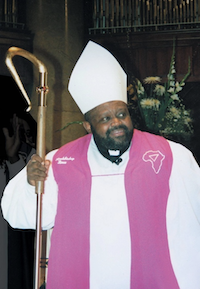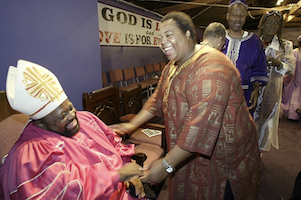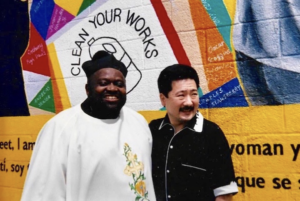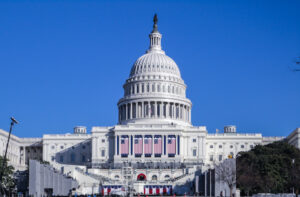Luego de meses de planificación, la Fraternidad de Hombres Gay de Color sobre prevención biomédica ha sido lanzada. El compromiso de les miembres me inspira [link to bios]. Es un privilegio poder amplificar sus voces según desarrollamos juntos esta campaña para las redes sociales.
Este programa es muy significativo para mí porque busca romper con los silencios. Como hombre gay nacido y criado dentro de un contexto colonial, los conozco muy de cerca. Me refiero a los silencios que se me impusieron. De la misma manera en que el poder político inhibe la autodeterminación de la isla, la normativa cultural en Puerto Rico se impone sobre mi cuerpo y mi sexualidad.
El motor de la resistencia al no conformar con la norma, ha sido para muchos de nosotros, el poder auto-empoderarnos y reclamar nuestro espacio y nuestras vidas. Resistir es informarnos, llenar los vacíos de una educación sexual ineficiente fundamentada en el miedo y la heteronorma. Me correspondió a mí resignificar mi sexualidad como hombre gay y aprender a disfrutar del placer sin reparos.
Nos encontramos en un momento histórico, donde los avances en la prevención biomédica nos dan la oportunidad de enfocarnos en el placer y no en el miedo. Desde el 2012, la PrEP(Profilaxis pre-exposición, por sus siglas en inglés) está disponible para prevenir el VIH. De igual modo, la profilaxis post-exposición, o PEP por sus siglas en inglés, puede ser tomada luego de un evento de exposición. Las personas que viven con VIH no transmiten el virus si su carga viral está no detectable; empoderándose de su estado de indetectabilidad para también enfocarse en el placer. Sin embargo, son las personas afectadas desproporcionalmente por la epidemia las que carecen de un acceso apropiado a estas nuevas tecnologías para la prevención.
Las personas de color hemos sido históricamente inhibidas de los procesos de toma de decisiones y a la equidad en el accesos a los sistemas de salud, impactando no tan solo nuestras experiencias de vida sino también lo más cercano que tenemos, nuestro cuerpo. A pesar de que la prevención biomédica ha avanzado, aún faltan espacios donde se hable para la comunidad desde la comunidad.
Bajo este fundamento es que se desarrolla la Fraternidad de Hombres Gays de Color. Aunque nuestras propias experiencias informan el trabajo que hacemos como parte de NMAC, reconocemos la importancia de proveer nuestras plataformas y su alcance a la diversidad de voces que compone nuestra comunidad. Desde la fraternidad se desarrolla una campaña de redes sociales fundamentada en sus 18 miembres. Se reconoce que son elles les expertes en sus experiencias y en cómo enfrentar los silencios, especialmente aquellos alrededor del sexo y el placer entre personas de color.
Desde el comienzo, les miembres han tenido la oportunidad de informar el desarrollo del branding, los temas a incluir y los visuales. Además de proveer un espacio para dialogar sobre las cosas que nos afectan como comunidad, el programa contiene varios componentes como entrenamientos, webinars dirigidos a nuestros constituyentes y oportunidades para extender sus redes, ya sea virtuales y personales.
Me siento honrado de contar con un grupo maravilloso de miembres con un compromiso y una pasión que me energiza. Abajo pueden encontrar algunos de sus trabajos. Si le interesa conocer más sobre la campaña siga #gmoc en todas las redes sociales. Para conocer más sobre cada uno de les miembres, presione aquí.
Damián Cabrera
Gerente de Programas- División de Tratamiento
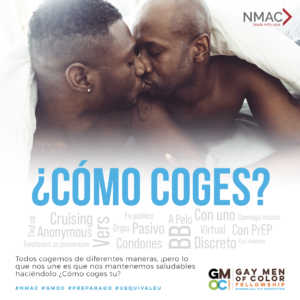
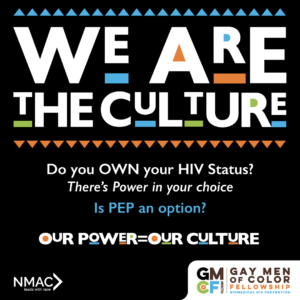
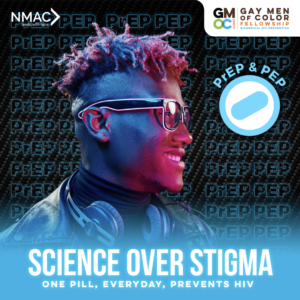
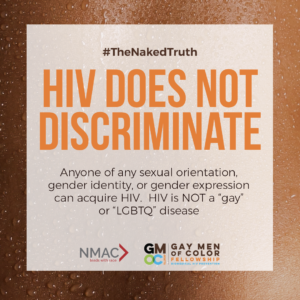

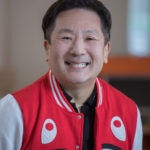
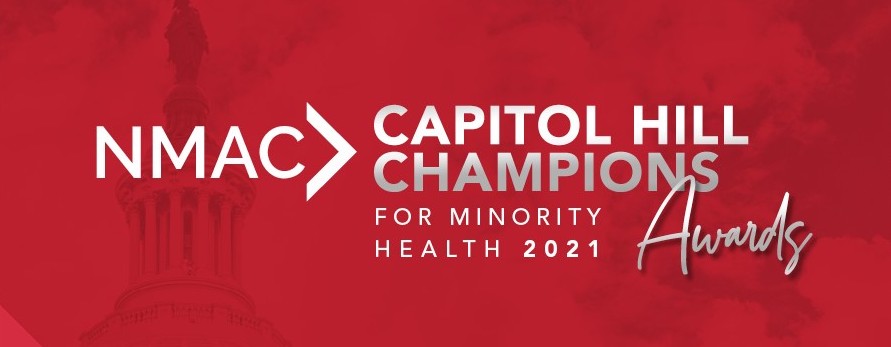

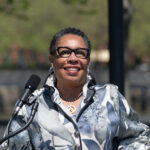

 Last year White America woke to the over policing of Black people through the killing of George Floyd and too many others to name. What happens when something is unfair to People of Color but needed in White communities? This is the paradigm shift that America is working to answer. In our fight to end HIV, PrEP users are 75% White, yet the majority of people living with HIV and the majority of new cases of HIV are among people of color. PrEP is reaching Gay White men, but not Gay Black men. What does that mean?
Last year White America woke to the over policing of Black people through the killing of George Floyd and too many others to name. What happens when something is unfair to People of Color but needed in White communities? This is the paradigm shift that America is working to answer. In our fight to end HIV, PrEP users are 75% White, yet the majority of people living with HIV and the majority of new cases of HIV are among people of color. PrEP is reaching Gay White men, but not Gay Black men. What does that mean? To my White friends, here is how I navigate these challenges. As an old fem Asian cisgender Gay man and the Executive Director of the agency formerly known as the National Minority AIDS Council, I am professionally aware of the privileges and discrimination that goes with how I present myself to the world. Part of my job is to hold-up communities that are often overlooked or undervalued. Most of my job is to listen and learn from those communities.
To my White friends, here is how I navigate these challenges. As an old fem Asian cisgender Gay man and the Executive Director of the agency formerly known as the National Minority AIDS Council, I am professionally aware of the privileges and discrimination that goes with how I present myself to the world. Part of my job is to hold-up communities that are often overlooked or undervalued. Most of my job is to listen and learn from those communities. Privilege is taking all the oxygen out of the room. I purposely use my privilege in rooms full of White people. I want them to understand that they are not the only important voices. It took me a long time to get comfortable, some would say too comfortable, with this privilege. As an Asian man, it was not something that came naturally. In the world of HIV, it is a very important skill. It is difficult if not impossible for many of you to understand what it means to present as White, yet it is something that every person of color intimately knows. Our value depends on how we present ourselves in the world. The closer we show up as white heterosexual men the better. For most of us that is impossible, yet that is the gold standard for power and wealth in America.
Privilege is taking all the oxygen out of the room. I purposely use my privilege in rooms full of White people. I want them to understand that they are not the only important voices. It took me a long time to get comfortable, some would say too comfortable, with this privilege. As an Asian man, it was not something that came naturally. In the world of HIV, it is a very important skill. It is difficult if not impossible for many of you to understand what it means to present as White, yet it is something that every person of color intimately knows. Our value depends on how we present ourselves in the world. The closer we show up as white heterosexual men the better. For most of us that is impossible, yet that is the gold standard for power and wealth in America. COVID, Black Lives Matter, the Jan. 6 insurrection, and climate change have forced a reckoning. We can probably end the HIV epidemic in the White community by 2030, but if we stay on the same course, I have real doubts about ending HIV in communities of color. This is my pledge to the HIV movement: what is fair cannot be based on White privilege. Our work must embrace the challenge of what is fair to communities who have lived under generations of discrimination and oppression. This is bigger than change; it is a shift in the paradigm. Ending the HIV epidemic in America starts by re-looking at what is fair.
COVID, Black Lives Matter, the Jan. 6 insurrection, and climate change have forced a reckoning. We can probably end the HIV epidemic in the White community by 2030, but if we stay on the same course, I have real doubts about ending HIV in communities of color. This is my pledge to the HIV movement: what is fair cannot be based on White privilege. Our work must embrace the challenge of what is fair to communities who have lived under generations of discrimination and oppression. This is bigger than change; it is a shift in the paradigm. Ending the HIV epidemic in America starts by re-looking at what is fair.
